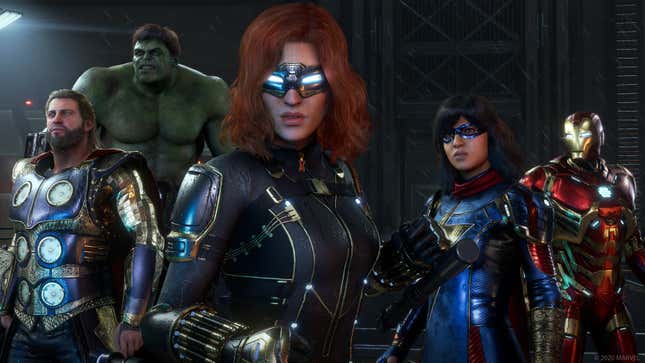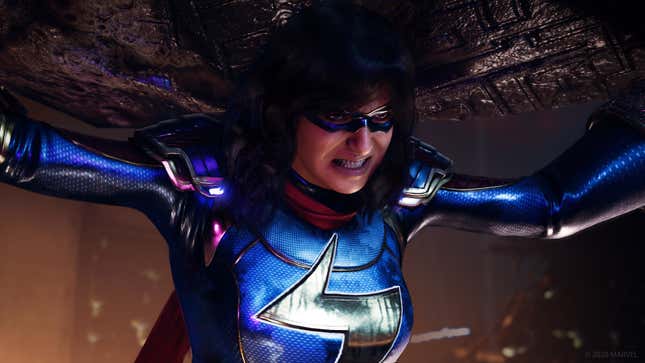
We can’t imagine it’s intentional, but Square Enix’s new blockbuster action RPG Marvel’s Avengers has a lot in common with its primary villain, Advanced Idea Mechanics mastermind George Tarleton. (Marvel nerds will know him better as big-headed science baddie M.O.D.O.K., though the game tragically never manages to work the “Mental Organism Designed Only For Killing” acronym into its actual text.) Like Tarleton—who, at least initially, seems to genuinely want to save the world from the mistakes that lead to half of San Francisco being blown to hell in the game’s prologue—there’s the core of something good, maybe even wonderful, lurking in the heart of this take on Earth’s mightiest heroes. But the parallels also run deeper, and darker, because—just like Tarleton—whatever goodness Avengers possesses eventually finds itself buried under a mountain of bad ideas, ill intentions, and mistakes, leaving the result as little more than a ruined, bloated mess.
The good is apparent and abundant from the jump, and embodied nowhere better than in the game’s handling of its central character: Avengers fangirl (and eventual member) Kamala Khan—a.k.a., the magnificent Ms. Marvel. Given that Kamala has become one of Marvel Comics’ most beloved characters in the years since her introduction back in 2013, it’s not surprising that developer Crystal Dynamics would use her as an entry point for a new Avengers game. But the writers also grasp why Kamala has become so beloved: her possession of a sincere love of superheroes that matches what so many real-world fans bring to these characters already. Kamala believes in heroes like Captain America, Thor, and Black Widow. She’s inspired to make the world better by their example. And when she has the chance to suddenly catapult herself into their ranks, she doesn’t just accept the burden of great power/responsibility/etc.: She has an absolute blast while doing so.
Avengers cements itself as Kamala’s story from its opening moments, with a fantastic sequence that sees her younger self wander through the festivities of Avengers Day—a celebration of superherodom she earned entry to as a finalist in a fan fiction contest, for her groundbreaking work The Avengers Vs. The Sewer Lizards. (You can read through the fic inside the game itself, and it is, unambiguously, a masterwork.) More than a tutorial on the game’s basic movement mechanics, this opening mission is a lesson on its entire ethos: When Kamala finds herself confronted by older bullies, she steels her nerve by quoting Captain America’s “You move” speech (itself paraphrased from an old Mark Twain line). When Cap overhears and compliments her for her bravery, it tells us as much about this version of the iconic character as it does about Kamala herself. And that’s exactly what makes Ms. Marvel so vital to this story—one that often drills, sometimes brutally, into the failings and weaknesses of its title characters: She never stops seeing the heroes in them, even when they’ve lost that clarity themselves. This opening sequence, sans superpowers, high-flying battles, or anything more dramatic than watching a young girl be tongue-tied while trading banter with the god of thunder, does more to sell the game’s premise and promise than any number of world-breaking battles could. And, unfortunately, it also sells it better than any of those more ostensibly exciting features actually end up doing.
Because the problems with actually playing Marvel’s Avengers crop up pretty damn fast, too—pretty much from the moment you get your hands on the Avengers themselves. We talked a bit, in our write-up of the game’s beta, about how strangely unsatisfying and lacking in weight its take on superhero combat can be. This varies from character to character—Thor acquits himself well, hurling his hammer across the battlefield and striking enemies with a meaty thunk, while Iron Man feels barely present at all—but fighting through the waves (and waves, and waves) of largely identical robot enemies that Avengers throws at you in every mission rarely rises above being a chaotic chore. (Someone in the game’s design team really seems to love making players waste time hurling rocks at stationary turrets, and we’d love a sincere answer as to why that could possibly be.) Even ignoring all the bugs, glitches, and outright typos we ran into in our pre-release play, the core battle mechanics of Marvel’s Avengers just feel sloppy. You’re supposed to feel like the planet’s most elite fighting force. In practice, you spend most of your time jamming buttons, flailing at foes, and just sort of generally hoping for the best.
If the issues with Avengers’ play stopped at this micro level—leaving its excellent story moored to a disappointing superhero battlin’ game—that would be disappointing enough. But Marvel’s Avengers swiftly reveals itself as a matryoshka of shitty game design ideas, each layer of sloppy glut building on the last. For instance: Ostensibly a role-playing game (but with far more owed to Destiny than Final Fantasy or Baldur’s Gate), Avengers takes the very off-theme step of linking its heroes’ power directly to their equipment. In practice, that means that, if you don’t want to see Captain America get his teeth kicked in by low-level AIM goons on the regular, you’re going to need to constantly scour the game’s semi-open-world levels for chests full of loot, seeking out incremental power boosts and comparing tiny shifts in numbers in search of a necessary edge. You can almost justify this sort of video game materialism with a tech-fetishist like Tony Stark, but the idea of Hulk pausing a battle to try to figure out which gloves will give him the advantage over a horde of ice robots is patently absurd. Worse, it’s boring. While there’s a glimmer of a good idea here—in so far as it allows for the possibility of customizing different heroes toward specific builds—in practice, you mostly just pick the stuff with the biggest number, then sink one of your nine (!) crafting currencies into the item to make the number go even higher. (Meanwhile, the decision to strenuously limit your inventory, forcing you to take time out of your superhero adventure game to manually break down dozens of pieces of old loot every hour or so, is another example of “throw 8 million turrets at them” thinking.)
Which brings us to the biggest shit-matryoshka layer of them all: Avengers’ completely unnecessary, unnatural status as a multiplayer, MMO-lite Destiny wannabe, complete with a Fortnite-lifted “battle pass” concept for unlocking character cosmetics. Because we played through Avengers’ campaign ahead of its release, we weren’t able to judge its merits as a co-op multiplayer game on their own. (We’ll be revisiting the game a week from now to look at those elements as the second part of our Games In Progress review.) But we can pass judgment on the distortions they impose on the game’s story structure, and that judgment would be that they’re, basically, the worst. At every step of the game’s narrative, it tosses distractions, breaks, and detours at you, all filtered through a shockingly unintuitive UI that seems far more interested in setting up raid groups than it is in helping you get a feel for Kamala’s story. (Remember Kamala? She’s still here, if you can find your way through the maze of menus, superfluous loading screens, and matchmaking prompts to get to her.) This omnipresent reminder that the story you’re playing through is just one seemingly tossed-off element of what’s clearly been designed to be a modular, games-as-service video game into infinity, steals focus from all of the things that might make Avengers great. There’s a constant sense of being rushed through the story so that you can get to all that sweet, profitable post-game content. And, hey. If it feels like we’ve just spent three long paragraphs describing an endless series of distractions, rather than talking about what makes the game itself succeed, well congratulations to us, because we’ve accurately conveyed exactly what playing Marvel’s Avengers feels like.
And yet.

And yet, there’s still greatness here—almost all of it on the writing side. There’s nothing wildly unique about Avengers’ story, a familiar tale of superheroes screwing up, breaking up, and eventually getting the band back together to make things right. But the grasp of its characters, their flaws, their strengths, and their voices are all resolutely on-point. And while it’s a tad distracting to hear the various voice actors give performances that are, like, two legally important degrees away from being direct impressions of their MCU counterparts, the acting itself is all top-notch. It’s telling that almost all of the game’s flaws are those of addition, bolting endless unnecessary systems onto an otherwise stable structure. (Mostly, anyway; that combat would still need work, and there’s something strangely perverse about making an Avengers game that only has literally three supervillains for you to fight.) In another world, this would have been one hell of a single-player, stand-alone Ms. Marvel game, complete with plenty of cameos from all her favorite heroes. For all the griping we get about superhero origin stories, watching Kamala Khan come into her own as a hero, the fangirl made not just good but great, is genuinely affecting and inspiring.
Pity about the rest of the game. It’ll make a hell of a Let’s Play video, though.